 Petzlover
Petzlover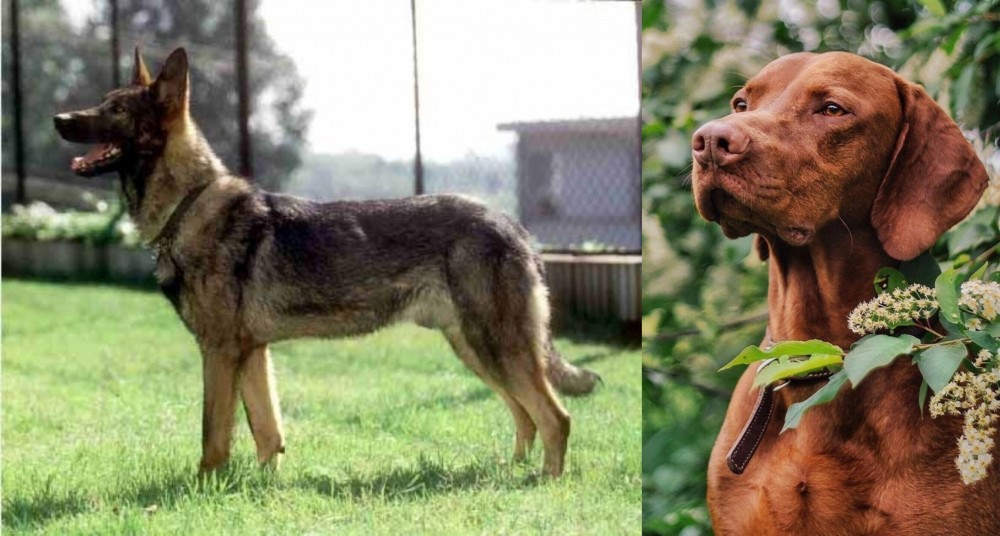 Kunming Dog is originated from China but Vizsla is originated from Hungary. Kunming Dog may grow 40 cm / 16 inches higher than Vizsla. Kunming Dog may weigh 8 kg / 18 pounds more than Vizsla. Kunming Dog may live 4 years more than Vizsla. Both Kunming Dog and Vizsla has almost same litter size. Kunming Dog requires Moderate Maintenance. But Vizsla requires Low Maintenance
Kunming Dog is originated from China but Vizsla is originated from Hungary. Kunming Dog may grow 40 cm / 16 inches higher than Vizsla. Kunming Dog may weigh 8 kg / 18 pounds more than Vizsla. Kunming Dog may live 4 years more than Vizsla. Both Kunming Dog and Vizsla has almost same litter size. Kunming Dog requires Moderate Maintenance. But Vizsla requires Low Maintenance
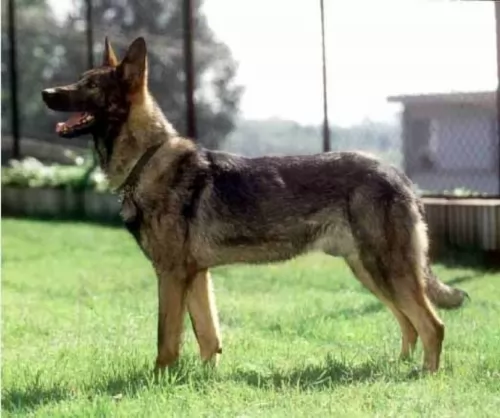 Known also as the Kunming Wolfdog, the Kunming Dog is similar in looks to the German Shepherd Dog, but the coat is recognizably shorter.
Known also as the Kunming Wolfdog, the Kunming Dog is similar in looks to the German Shepherd Dog, but the coat is recognizably shorter.
It’s an attractive looking wolf-like dog which comes from China. It isn’t quite clear which dog breeds were used in the gene pool for these Kunming wolfdogs. You can see though that the German Shepherd as well as other wolfdog-crosses have played a part in the breed's origin.
The dog was created in the early 1950s for military- and guard dog purposes. In 1988, the Chinese Public Security Bureau officially recognized the Kunming Dog as a breed. Today, the dog is still used in military and police services.
 The Hungarian Vizsla or Magyar Vizsla is a hunting dog developed in Hungry. It is the smallest of the pointer-retriever type breeds. They are loyal family dogs and hunt fowl and upland game. It was rare for a hunting dog to also be a companion and family dog, but the Vizsla is. The first time the Vizsla came to the attention of anyone outside its area was 1357 in a publication written for King Louis I of Hungary. They were kept mostly by barons and warlords and preserved without any interbreeding for centuries.
The Hungarian Vizsla or Magyar Vizsla is a hunting dog developed in Hungry. It is the smallest of the pointer-retriever type breeds. They are loyal family dogs and hunt fowl and upland game. It was rare for a hunting dog to also be a companion and family dog, but the Vizsla is. The first time the Vizsla came to the attention of anyone outside its area was 1357 in a publication written for King Louis I of Hungary. They were kept mostly by barons and warlords and preserved without any interbreeding for centuries.
Through all the occupations, revolutions and world wars, the Vizsla survived. Still there were some points in their history where they were almost extinct. In the 1800’s English Pointers and German Shorthaired Pointers almost replaced them. After World War II they were almost extinct again with only a dozen or so left in the country.
Breeders across Hungry brought them back again. They were also bred in Serbia, Slovakia, Austria and Romania. They came to the states after the war and quickly were embraced. The Vizsla Club of America was formed so that they could be recognized by the American Kennel Club. This happened in 1960 and the Vizsla quickly became a champion in several AKC specialties.
The Weimaraner, the German Shorthaired Pointers, the Wirehaired Vizsla and other pointers were developed from the Vizsla and then used to re-establish the breed following World War II.
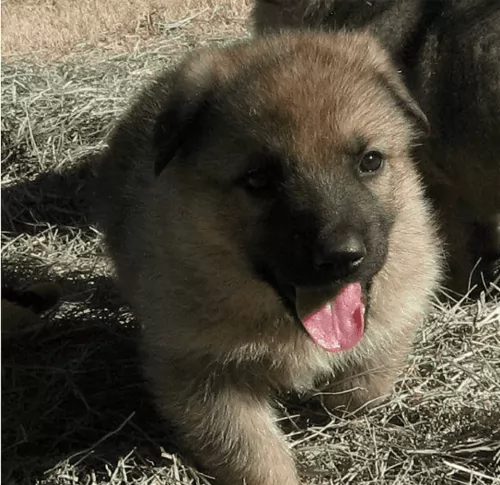 The Kunming is a large dog, athletic and muscular, standing at 60 – 68cm and weighing 30 – 38kg. They are dogs which fall under the Spitz type category.
The Kunming is a large dog, athletic and muscular, standing at 60 – 68cm and weighing 30 – 38kg. They are dogs which fall under the Spitz type category.
The dog has a coat which is considered seasonal - double layered in the cooler months and shedding to a shorter coat in the hotter months. The thick coat can be a light tan color to white and he has a black saddle pattern, giving the dog an overall black and tan combination.
The bushy tail is long and its carried down and low except when the dog is excited and alert, then it lifts its tail. The ears are erect like that of the German Shepherd or Wolf.
He isn’t the best breed for a first time owner as he is very strong willed and can tend to become aggressive. It is why he has been used to perform tasks in the military.
These dogs are known for their alertness, and to keep him mentally balanced and amicable, he will need a strong, firm owner who is also fair, patient and consistent. Bored and frustrated, a Kunming can become unpredictable and a first time dog owner might not be able to cope with such an independent, strong-willed, determined, confident dog.
He is also energetic and intelligent, making a great family dog as he is loyal, loving and devoted. His intelligence allows him to learn easily too. Training and socialization will be required if you want him to be obedient.
He is adaptable and can adjust to life in the city or the countryside, but essentially he is better suited to a home with large grounds as he is a dog which is full of energy.
 The golden/rust colored Vizsla is easily distinguished from other breed. They are a medium sixed pointer with a lean frame and light on their feet. They have long ears that are silky to the touch and well defined muscular structure. Their nose is a red color blending in with their coat color. Their eyes and nails also blend in with the color of the coat.
The golden/rust colored Vizsla is easily distinguished from other breed. They are a medium sixed pointer with a lean frame and light on their feet. They have long ears that are silky to the touch and well defined muscular structure. Their nose is a red color blending in with their coat color. Their eyes and nails also blend in with the color of the coat.
For the most part they are some shade of golden-rust, but today there are also some solid rust dogs as well. Officially the coat can be russet gold, copper-brown, or dark sandy gold. It cannot be mahogany red or pale yellow. The coat is dense, smooth, short and without an undercoat. They have docked tails as well.
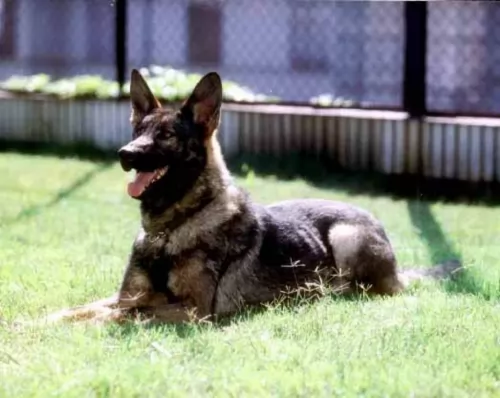 Your attractive Kunming dog is an energetic, lively dog who is going to require a good deal of exercise as he was developed to be a working dog.
Your attractive Kunming dog is an energetic, lively dog who is going to require a good deal of exercise as he was developed to be a working dog.
They are loving towards their human families and even well behaved with other dogs in the family. He will however need socialization and training from a firm, fair, consistent owner.
Provide him with a loving environment, lots of exercise, wholesome food, a warm, dry place to sleep and lots of mental and physical stimulation, and you’ll have a wonderful, contended pet and companion.
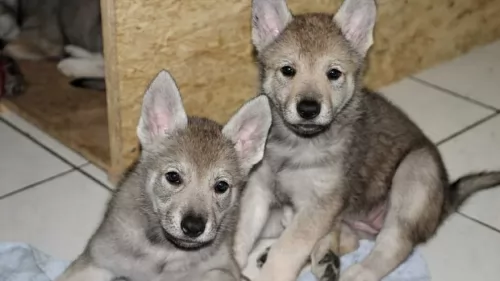 Your Kunming can reach 12 to 14 years of age if he is loved, fed correctly and adequately exercised. Just as with any dog, he can be susceptible to some of the common dog illnesses. These include the likes of hip dysplasia, bloat, epilepsy, eye problems, ear infections, intestinal parasites, heart disease and skin problems.
Your Kunming can reach 12 to 14 years of age if he is loved, fed correctly and adequately exercised. Just as with any dog, he can be susceptible to some of the common dog illnesses. These include the likes of hip dysplasia, bloat, epilepsy, eye problems, ear infections, intestinal parasites, heart disease and skin problems.
Worms are a chronic problem in dogs and the thing is, they can infect humans too. If you don’t treat worms in your dog, it can lead to your pet becoming seriously ill. You may notice loss of appetite, a dull, thinning coat, anemia and diarrhea.
The vet will be able to offer a treatment that can help with eradicating hook-, round- and tapeworms.
This may sound like a mild dog disease but it can cause a lot of misery for your pet. You’ll notice your pet licking, scratching and biting at raw, red spots on his skin. With bacterial- or yeast infections, your pet can battle with itchiness, pain and discomfort. Luckily your vet can recommend treatments to effectively alleviate symptoms.
 The Vizsla have few health issues but the ones they do have are quite serious. They include:
The Vizsla have few health issues but the ones they do have are quite serious. They include:
• Cancer (Mast cell, Lymphoma and Hemangiosarcoma) – as will most dogs it can be treated but is still likely to kill the dog.
• Hip dysplasia is rare, but cases have been noted. Can cause lameness and/or arthritis.
• Sebaceous adenitis – rare skin disease found more often in cats or birds than in dogs.
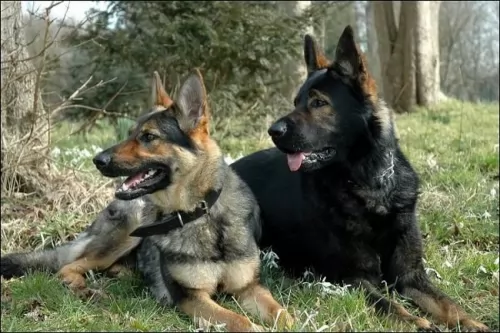 Grooming for the thick coat should be done regularly. The dog sheds quite a bit and seasonally and you'll want to brush him twice a week to rid the coat of those loose hairs.
Grooming for the thick coat should be done regularly. The dog sheds quite a bit and seasonally and you'll want to brush him twice a week to rid the coat of those loose hairs.
The Kunming Dog is high energy and will therefore suit a family who is active and sporty. He is the kind of dog that you can include in all your activities – walks, hikes, running next to you when you go cycling and swimming.
This is an active dog and you want the best food for him, packed with vitamins and minerals to keep him lively and energetic. Instead of giving him one large meal a day that he gulps down quickly, split his food into 2 smaller meals.
Your dog’s age, his breed and his energy levels will direct you as to how to feed him.
Remember, that although commercially manufactured dog foods need to comply with certain standards, it doesn't guarantee their goodness. It may not be digestible for your pet. If you want to use one of these foods, choose the best there is and try to mix in some wholesome home-made food from time to time.
Cooked chicken, brown rice or pasta and some raw or cooked vegetables can be excellent for him as well as adding in some raw meat occasionally.
 Feeding the puppy This is a very active dog and he need a high calorie diet as a puppy. Feed 4-5 cups in 3-4 smaller meals per day.
Feeding the puppy This is a very active dog and he need a high calorie diet as a puppy. Feed 4-5 cups in 3-4 smaller meals per day.
2.Feeding the adult Feed the adult high calorie food if you exercise her enough. Feed 3 cups of food twice a day.
4. Exercise They love to run but don’t’ overdo it until they are at least 18 to 24 months old. They stay very playful their entire lives and excel at AKC competitions. They are good at agility, field trials, scent work, obedience, conformation, dock diving, rally, lure coursing, track and barn hunt.